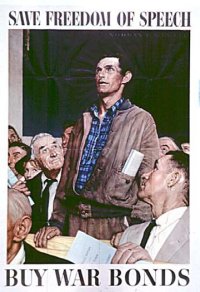Another term for open source

Open source is the democratic process applied to software, just as Wikipedia is the same process applied to the collection of information.
(Norman Rockwell's Four Freedom paintings, including Freedom of Speech to the right, were originally created to sell War Bonds during World War II. From the National Archives.)
A proprietary software model is more like China. Only the leaders get to know what is going on in the code. The company is like the Communist Party, and you're only in on the change process if you're inside.
By contrast open source offers true democracy, more like that of a Vermont town meeting than the U.S. Congress. Everyone has a voice. Everyone can see the code, edit the code, fix the code. Official changes go through an official process, but that process too is open and transparent.
Some may think my pitching open source as democratic software and proprietary software as autocratic software is some kind of public relations exercise.
They would be right. But open source itself was created as a PR move, in reaction to the dogmatism of the FOSS movement.
One point I have to make about open source again-and-again is that the term was created as a reaction against the concept of Free and Open Source Software (FOSS) pushed by people like Richard Stallman, whose freedoms included one to gain improvements from the community.
Entering into the community through a license like the GPL gave equal rights to all, but some felt it placed unequal responsibilities on some, namely those who contributed the biggest improvements to the code base and who might want to profit from that knowledge.
They were looking at the GPL through an economist's eyes. They wanted a meritocracy. They wanted entrepreneurs and free enterprise to gain a seat at the table, to drive the software forward.
The roots of this understanding can be seen in licenses like the BSD License, the Apache License, and the Eclipse License. While the GPL is still the leading open source license its roots lie in FOSS, not open source.
To people like Eric Raymond, sharing did not work as an economic model, even though the GPL turns out to be the best way for business to get maximum input from the community for open source software.
But visible code, and whether it's BSD or GPL all open source code is visible, is inherently democratic. So why not just call open source democratic software?
